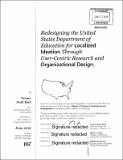Redesigning the United States Department of Education for localized ideation through user-centric research and organizational design
Author(s)
Reid, Tanner Scott.
Download1119537392-MIT.pdf (16.51Mb)
Other Contributors
Massachusetts Institute of Technology. Engineering and Management Program.
System Design and Management Program.
Advisor
Maria C. Yang.
Terms of use
Metadata
Show full item recordAbstract
Education inequality in the United States is a complex challenge to tackle, and one that a centralized enterprise isn't always equipped to address. The United States Department of Education has a mission to bring a quality, globally-competitive education to all students in the US, but leaves to the states much of the power to enact policy towards that end - the department itself recognizes that states are responsible for curriculum development, graduation standards, school facilities, standardized tests, community programs, and other factors that affect educational outcomes. While the federal Department of Education provides quantitative data collection and publishing, student loan programs, anti-discrimination mandates, and other initiatives vital to the management of education nationwide, compared to states, they are relatively distanced from the local issues that hugely impact end education experience. This thesis proposes an enterprise-level transformation of the department, envisioning an organization that runs much like a design firm to perform localized, targeted, user-centric research to facilitate ideation and insight-sharing among states and like-communities across the country. To do this, a systems-analysis approach is employed to break down the current architecture, run stakeholder analysis, conceptualize a number of ideas meant to spark further ideation in the organizational-design space, evaluate those ideas, and develop one further. A two-part organizational solution to foster localized ideation for states and communities is outlined: (1) a design-firm-like organization within the department that appoints two research fellows in each state to help connect state efforts to federal efforts while using these two fellows to build a qualitative database that can fill the gaps left with quantitative methods, and (2) a matrix research and development structure that combines the two groups into one organization that works across channels for rural, urban, and suburban insights and initiatives. The case is made that this is the best way to divide the organization (as opposed to geographic or functional organizations), due to the similarities in community structure and resources in each category. This exploration aims to prove that systemic actions (and not just specific policy proposals) can have a substantial impact on government innovation and social outcomes.
Description
Thesis: S.M. in Engineering and Management, Massachusetts Institute of Technology, System Design and Management Program, 2019 Cataloged from PDF version of thesis. Includes bibliographical references (pages 73-74).
Date issued
2019Department
Massachusetts Institute of Technology. Engineering and Management ProgramPublisher
Massachusetts Institute of Technology
Keywords
Engineering and Management Program., System Design and Management Program.